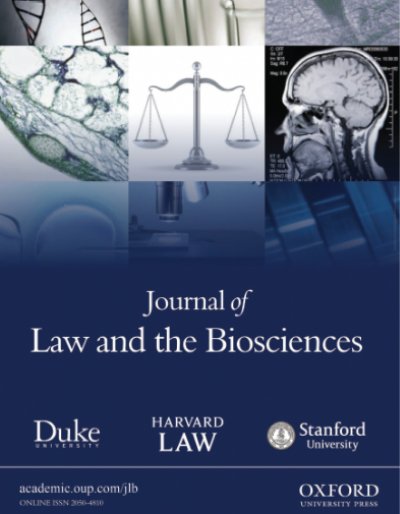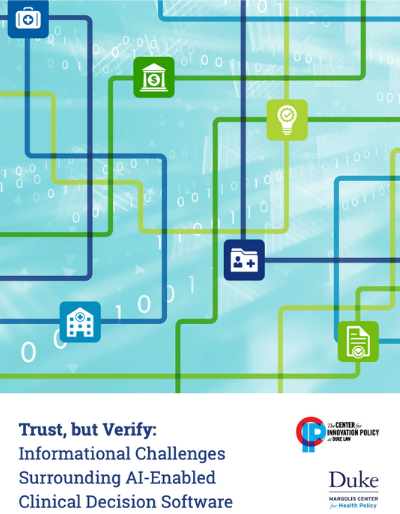The Center for Innovation Policy
The Center for Innovation Policy at Duke Law is a forum for independent analysis and balanced discussion of policies for promoting technological innovation that enhances long-term social welfare.
Latest News
Recent Events
November 03, 2023
- • See description
Please join us for a unique event at Duke on the CHIPS and Science Act of 2022, a historic law that directs $52 billion in government spending to spur computer chip manufacturing and R&D in the United States. The event will feature experts from across the country and from all over Duke, including the Deans of Fuqua, Sanford, and Pratt along with Professor Ronnie Chatterji, who led implementation of the CHIPS Act in the Biden Administration before returning to Duke this fall. Space is limited and registration is required. Register for the conference here: https://duke.qualtrics.com/jfe/form/SV_5ASZsBdEGyQzpDo Sponsored by The Center for Innovation Policy at Duke Law and Duke Fuqua School of Business. For more information, please contact Leanna Doty at leanna.doty@law.duke.edu.
December 02, 2022
- • Virtual
As U.S. universities continue to internationalize their campuses, they benefit greatly from increased connectivity with their counterpart institutions abroad. Cross border research collaborations have increased as have student and scholar exchanges. At the same time, as American universities become more globally engaged, they have encountered a broad array of new challenges at home stemming from growing national security concerns as well as concerns about protecting the integrity of the U.S. R&D system. Our panelists, Lora Weiss, Penn State Univ., and Kelvin Droegemeier, Univ. of Oklahoma, have found themselves knee-deep in dealing with the various compliance issues and new regulations that have emerged as well as the impact of these issues on the innovation process itself. Our moderator, Denis Simon, The Center for Innovation Policy at Duke Law, will guide a discussion regarding how the performance of university research is being affected in both positive and negative ways. Sponsored by The Center for Innovation Policy at Duke Law; the Sanford Cyber Policy Program; the Duke Office of Research & Innovation; and, DQ, the Certificate in Digital Intelligence at Duke Science & Society. Registration required: https://bit.ly/3FJLnMI. For more information, please contact Balfour Smith (bsmith@law.duke.edu).
November 09, 2022
- • Law School 3037
Join The Center for Innovation Policy at Duke Law, the Duke Sanford Cyber Policy Program, and DQ-Certificate in Digital Intelligence Program of the Duke Initiative for Science & Society for a program focusing on the importance of semiconductors in the global economy with Jimmy Goodrich, Vice President for Global Policy, Semiconductor Industry Association. This program is part of a series of events focusing on the policy issues surrounding semiconductor manufacturing and supply chain. Lunch will be provided. Contact Bonnie Blundell (bonnie.blundell@law.duke.edu).
November 08, 2022
- • Law School 3037
Join the Under Secretary of Commerce for Intellectual Property, Ms. Kathi Vidal, the heads of the European Patent Office and the Japan Patent Office, and WIPO Deputy Director General, Ms. Lisa Jorgenson, in a dialogue with innovators and entrepreneurs from the Research Triangle Park area. The discussion will center around the theme of the 40th Trilateral Conference, i.e., enhancing the accessibility of the patent system for small- and medium-sized enterprises. You can attend in person (limited space), join the livestream, or view the recording after the event; however, registration (by Nov. 7) is required: https://bit.ly/3SBHKvi. Sponsored by The Center for Innovation Policy, the USPTO, and the Trilateral Cooperation. For more information, please contact Balfour Smith at bsmith@law.duke.edu.
October 24, 2022
- • Law School 4042
Join The Center for Innovation Policy at Duke Law, the Duke Sanford Cyber Policy Program, and DQ, the Certificate in Digital Intelligence program of the Duke Initiative for Science and Society, for a talk with Riccardo Masucci, Intel Corporation, focusing on these important developments. This program is part of a series of events focusing on the policy issues surrounding semiconductor manufacturing and supply chain. Lunch will be provided. For more information please contact Balfour Smith (bsmith@law.duke.edu).
 November 2020
November 2020
Accountability, Secrecy, and Innovation in AI-Enabled Clinical Decision Software
Arti K. Rai, Isha Sharma, & Christina Silcox
Journal of Law and the Biosciences
14 November 2020
This article employs analytical and empirical tools to dissect the complex relationship between secrecy, accountability, and innovation incentives in clinical decision software enabled by machine learning (ML-CD). The authors provide specific suggestions for how FDA regulation, patent law, and tort liability could be tweaked to improve information flow without sacrificing innovation incentives.
 September 2020
September 2020
Trust, but Verify: Informational Challenges Surrounding AI-Enabled Clinical Decision Software
Christina Silcox, Arti K. Rai, & Isha Sharma
18 September 2020
The Center for Innovation Policy at Duke Law and the Duke-Margolis Center for Health Policy white paper, funded by the Greenwall Foundation, discusses ways to incentivize innovation in AI-enabled medical products while effectively communicating how and when to use them.
 March 2018
March 2018
Righting the Research Imbalance
Stephen A. Merrill
March 2018
Research in the physical sciences and engineering yields results important to technological innovation, national security, and economic growth. But since the end of the Cold War, public funding of work in these fields has lagged in relation to the size of the economy, expenditures by governments of other countries, and our own government’s support of the biological and medical sciences. This white paper documents the extent of the deficit, explains how it came about and why attempts to correct it have failed, shows that non-federal government sources of funding have not stepped up to compensate, and discusses needed next steps.




